
Walter Whitman Jr. was an American poet, essayist, and journalist. He is considered one of the most influential poets in American literature. Whitman incorporated both transcendentalism and realism in his writings and is often called the father of free verse. His work was controversial in his time, particularly his 1855 poetry collection Leaves of Grass, which was described by some as obscene for its overt sensuality.

Leaves of Grass is a poetry collection by American poet Walt Whitman. Though it was first published in 1855, Whitman spent most of his professional life writing, rewriting, and expanding Leaves of Grass until his death in 1892. Six or nine individual editions of Leaves of Grass were produced, depending on how they are distinguished. This resulted in vastly different editions over four decades. The first edition was a small book of twelve poems, and the last was a compilation of over 400.
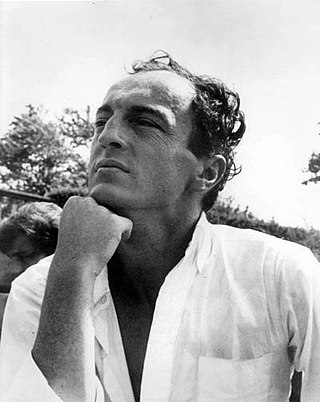
Francis Russell "Frank" O'Hara was an American writer, poet, and art critic. A curator at the Museum of Modern Art, O'Hara became prominent in New York City's art world. O'Hara is regarded as a leading figure in the New York School, an informal group of artists, writers, and musicians who drew inspiration from jazz, surrealism, abstract expressionism, action painting, and contemporary avant-garde art movements.
Antler is an American poet who lives in Wisconsin.

Fitz-Greene Halleck was an American poet and member of the Knickerbocker Group. Born and raised in Guilford, Connecticut, he went to New York City at the age of 20, and lived and worked there for nearly four decades. He was sometimes called "the American Byron". His poetry was popular and widely read but later fell out of favor. It has been studied since the late twentieth century for its homosexual themes and insights into nineteenth-century society.
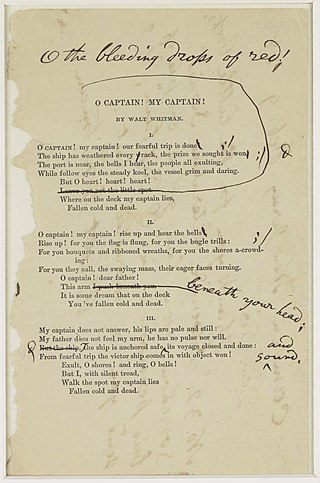
"O Captain! My Captain!" is an extended metaphor poem written by Walt Whitman in 1865 about the death of U.S. president Abraham Lincoln. Well received upon publication, the poem was Whitman's first to be anthologized and the most popular during his lifetime. Together with "When Lilacs Last in the Dooryard Bloom'd", "Hush'd Be the Camps To-Day", and "This Dust Was Once the Man", it is one of four poems written by Whitman about the death of Lincoln.

"When Lilacs Last in the Dooryard Bloom'd" is a long poem written by American poet Walt Whitman (1819–1892) as an elegy to President Abraham Lincoln. It was written in the summer of 1865 during a period of profound national mourning in the aftermath of the president's assassination on 15 April of that year.

Wilson Pugsley MacDonald was a popular Canadian poet who "was known mainly in his own time for his considerable platform abilities" as a reader of his poetry. By reading fees, and by selling his books at readings, he was able to make a living from his poetry alone. In the 1920s he was so popular that, according to writer John Robert Colombo, "his fame eclipsed that of Robert Service and Pauline Johnson."

William Winter was an American dramatic critic and author, born in Gloucester, Massachusetts. He graduated from Harvard Law School in 1857, then chose literature as his field of endeavor, and moved to New York City (1859), where he became literary critic of the Saturday Press, then (1861–65) of the New York Albion, and for more than 40 years (1865–1909) was a drama critic of the New York Tribune.
Nationality words link to articles with information on the nation's poetry or literature.
M. C. Gardner is an American playwright, biographer, and cultural essayist. His given name is Michael Charles. He was born in Glendale, CA July 1, 1951. He is one of the founders and editors of the literary website AnotherAmerica.org. He currently resides in Los Angeles, CA.

"A Noiseless Patient Spider" is a short poem by Walt Whitman. It was originally part of his poem "Whispers of Heavenly Death", written expressly for The Broadway, A London Magazine, issue 10, numbered as stanza "3." It was retitled "A Noiseless Patient Spider" and reprinted as part of a larger cluster in Passage to India (1871). The poem was later published in Whitman's poetry collection Leaves of Grass. The poem has inspired other poets and musical compositions for its theme of the individual soul in relation to the world.
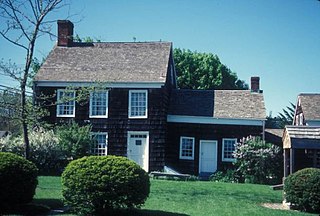
The Walt Whitman Birthplace State Historic Site is a state historic site in West Hills, New York, listed on the National Register of Historic Places. The site preserves the birthplace of American poet Walt Whitman.

"Hush'd Be the Camps To-Day" is a poem by Walt Whitman dedicated to Abraham Lincoln. The poem was written on April 19, 1865, shortly after Lincoln's assassination. Whitman greatly admired Lincoln and went on to write additional poetry about him: "O Captain! My Captain!", "When Lilacs Last in the Dooryard Bloom'd", and "This Dust Was Once the Man." "Hush'd" is not particularly well known, and is generally considered to have been hastily written. Some critics highlight the poem as Whitman's first attempt to respond to Lincoln's death and emphasize that it would have drawn comparatively little attention if Whitman had not written his other poems on Lincoln.
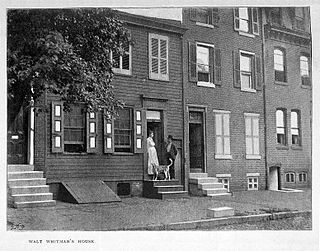
The Walt Whitman House is a historic building in Camden, New Jersey, United States, which was the last residence of American poet Walt Whitman, in his declining years before his death. It is located at 330 Dr. Martin Luther King Jr. Boulevard, known as Mickle St. during Whitman's time there.
"Out of the Cradle Endlessly Rocking" by American poet Walt Whitman is one of his most complex and successfully integrated poems. Whitman used several new techniques in the poem. One is the use of images like bird, boy, sea. The influence of music is also seen in opera form. Some critics have taken the poem to be an elegy mourning the death of someone dear to him. The basic theme of the poem is the relationship between suffering and art. It shows how a boy matures into a poet through his experience of love and death. Art is a sublimation of frustrations and death is a release from the stress and strains caused by such frustrations. The language is similar to "There Was a Child Went Forth".

Drum-Taps is a collection of poetry composed by American poet Walt Whitman during the American Civil War. The collection was published in May 1865. The first 500 copies of the collection were printed in April 1865, the same month President Abraham Lincoln was assassinated.

The American poet Walt Whitman greatly admired Abraham Lincoln, the 16th president of the United States, and was deeply affected by his assassination, writing several poems as elegies and giving a series of lectures on Lincoln. The two never met. Shortly after Lincoln was killed in April 1865, Whitman hastily wrote the first of his Lincoln poems, "Hush'd Be the Camps To-Day". In the following months, he wrote two more: "O Captain! My Captain!" and "When Lilacs Last in the Dooryard Bloom'd". Both appeared in his collection Sequel to Drum-Taps later that year. The poems—particularly "My Captain!"—were well received and popular upon publication and, in the following years, Whitman styled himself as an interpreter of Lincoln. In 1871, his fourth poem on Lincoln, "This Dust Was Once the Man", was published, and the four were grouped together as the "President Lincoln's Burial Hymn" cluster in Passage to India. In 1881, the poems were republished in the "Memories of President Lincoln" cluster of Leaves of Grass.
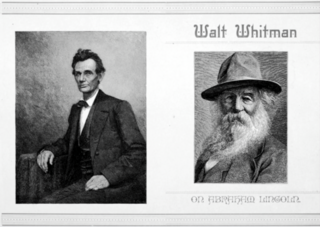
The American poet Walt Whitman gave a lecture on Abraham Lincoln, the 16th president of the United States, several times between 1879 and 1890. The lecture centered on the assassination of Lincoln, but also covered years leading up to and during the American Civil War and often included readings of poems such as "O Captain! My Captain!". The deliveries were generally well received, and cemented Whitman's public image as an authority on Lincoln.
"The Sleepers" is a poem by Walt Whitman. The poem was first published in the first edition of Leaves of Grass (1855), but was re-titled and heavily revised several times throughout Whitman's life.
















